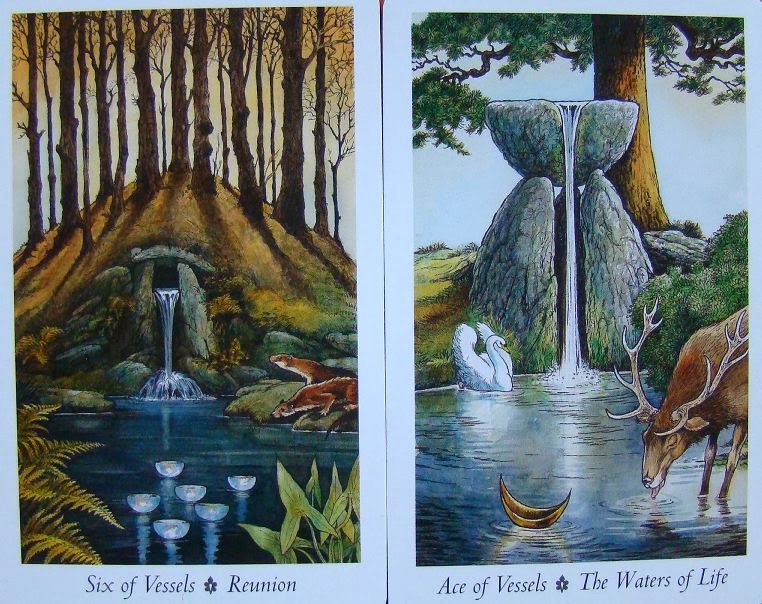"So there, by the divine waters of Danu, from where those waters rose and flooded through the now fertile green valleys of the Earth, eastwards towards a distant sea, The Dagda and Brigid settled. And they called the great course of eastward rushing water after the Mother Goddess, which is Danuvius, whose children still know it as the mighty Danube."
-Celtic Myths and Legends-
The Goddess Danu is perhaps one of the more well known figures of the Celtic Pantheon. For many, Danu is the Mother Goddess. It is Danu that is the mother of Brigid, a bond so linked that in many traditions Danu disappeared altogether. Some believe Danu to be the oldest deity in Celtic circles. This is with good reason, as the root dan is Old Irish meaning knowledge. It is knowledge that is the essence of Danu, as the Celts believed all knowledge was found at the water's edge. More endearingly, the Celtic Gods, or the Tuatha De Danann are called, the Children of Danu. Some have come to incorporate Danu with the Goddesses Anu, and the Morrigan. One cannot escape the importance of Danu within the Celtic Pantheon is some way.
My own journey with Danu happened quite early, as she was the first Goddess that I heard any myths about. I have to admit that at first, I was unaware of her affiliation with the Morrigan, or with the Goddess Brigid. At the time, I focused more of my efforts on learning about the Morrigan, because that was how I started on the path to a Celtic Pantheon. For awhile, I forgot completely about Danu, until coming across the Goddess Anu. While I posted about Anu before, she is an Earth Goddess, while Danu is a Water Goddess. The two go together quite well, but at the time I didn't see or realize that. Danu truly didn't come into importance for my journey, until I started to meditate for an aspect of the Goddess to guide me.
While meditating, I saw a great river, though calm and quite peaceful. I sat at the edge of it, and simply watched the water flow by. After some time, I felt myself let go, and become immersed in this great river. The flow of the river led to a wooden clearing, though with a pool of water from the river. It was there that I was led, and there I rested. Such peace and calm had never been felt in my meditations before then, and I could have stayed in that moment for some time. In that circle, that pool of water, I saw a woman. All I could do was ask her name, and it was the Goddess Danu. With her name, came the understanding that all knowledge was linked to that place, and at the edge of the water.
I had wanted to do a Pagan blog for some time, though I had no idea how to start. At the time, I didn't even have a name for it. Danu, and the legends of Danu, gave this blog its name. Soon, all the pieces began falling into place, and everything has worked out better than expected. Each time I write a new posting though, I am reminded of where the source of my knowledge comes from. It is a small, and yet powerful reminder of the presence Danu has in my path now. There are many aspects left to be revealed about Danu's nature, but the parts I do understand are wonderful. The aspect of Danu brings a comfort, which can only be likened to that of a mother's love.
Though I had my spiritual guide for this path, I was unsure of how it all fit. As I said previously, I felt a strong pull towards the Goddess Anu instead. Not to mention, I felt a sense of loyalty to the Morrigan, which had started this journey in the first place. With trust, and a bit of time, things began falling into place though. Both Danu and Anu are linked to the Morrigan, though with different opinions or traditions. This caused a sense of ease and transition began to take place. I saw the picture as a whole, instead of just pieces of it. Learning to balance the influences of both Anu and Danu, gave me a better understanding of the path I wanted to walk. Anu is earth based, while Danu remains more water based.
All of this has led to a deeper understanding of Goddess I didn't even know were out there. On this path, I'm learning that while the Morrigan may seem complex, all paths lead to one source. In forming this new Tradition, in blending Druidry, Celtic, and Arthurian paths, Danu makes all the more sense. It is knowledge that is at the heart of any path. The creativity and love sparked by Danu, is a driving influence for the knowledge I seek out in the future. I know, that wherever this path takes me, that Danu will somehow be an intimate part of it. The Celtic Legends speak of how Brigid returned to the edges of the Danube to teach the Tuatha De Danann all there was to know. So too, do I seek the water's edge, in search of all that is to be revealed.


.JPG)
